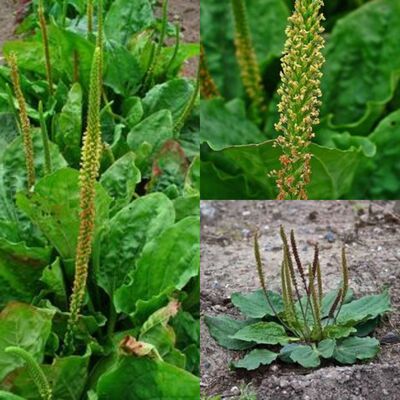Plantain weed, scientifically known as Plantago major, may be considered a stubborn weed by some, but it offers numerous health benefits and has been used in traditional medicine for centuries. This hardy plant with oval-shaped leaves and tall spikes of seeds can be found in yards, fields, and along roadways. Let’s explore the uses, nutritional content, and potential risks of this widely available herb.
Don’t confuse plantain weed with the banana-like fruit. Plantain weed, also known as broadleaf plantain, is a perennial plant that forms a rosette pattern close to the ground. You’ll often find it thriving in areas with disturbed soil, like roadsides and gardens.
Historically, plantain weed has been used in herbal medicine to treat various ailments, including coughs, wounds, and digestive issues. While modern scientific research is still underway to confirm all of its traditional uses, some studies support its potential health benefits.
Did you know that several parts of the plantain weed are actually edible? Here are some delicious ways to include them in your meals:
Leaves: The young, tender leaves can be eaten raw in salads or smoothies. Older leaves can still be used in soups, stews, or sautéed like other leafy greens. Cooking the older leaves helps soften their texture.
Seeds: The seeds, which have a nutty flavor, can be consumed as well. They are sometimes referred to as “poor man’s asparagus” because of their appearance. Even when the seed spikes turn brown, the seeds remain edible. However, it’s important to consume them in moderation to avoid a drop in blood pressure.
Seed Shoots: These shoots can be harvested and used in various dishes for added crunch and flavor.
Plantain weed is highly nutritious, packed with essential vitamins and minerals, such as:
- Calcium: Supports bone health and muscle function.
- Vitamin K: Plays a crucial role in blood clotting and bone health.
- Vitamin C: Acts as a powerful antioxidant, boosting the immune system and promoting healthy skin.
- Vitamin A: Supports eye health and immune function.
By adding plantain weed to your diet, you can enhance your nutritional intake and support overall health.
Beyond its nutritional value, plantain weed has a long history in traditional and herbal medicine. Here are some potential health benefits that have been studied:
Anti-Inflammatory Properties: Plantain leaves contain compounds with anti-inflammatory effects. While more research is needed to confirm these effects in humans, its traditional use as an anti-inflammatory remedy shows promise.
Digestive Health: The seeds of plantain weed are rich in soluble fiber, similar to psyllium. This type of fiber can help manage diarrhea and promote regular digestion.
Wound Healing: Plantain has been used for wound healing due to its antimicrobial, antioxidant, and anti-inflammatory properties. Studies have shown its potential for promoting skin healing.
Interested in incorporating plantain weed into your routine? Here are a few ways you can use it:
Fresh Plant Use: If you have plantain growing in your yard, you can add the young leaves to salads, smoothies, or soups. The seeds can also be harvested and used as a topping. Cooking the older leaves can help reduce their toughness.
Herbal Supplements: Plantain supplements are available in various forms. The standard dosage is generally 3 to 5 grams per day. It can also be applied topically to help heal minor wounds or skin irritations.
Topical Application: Plantain weed can be made into salves or poultices for cuts, insect bites, or rashes. A simple poultice can be made by crushing fresh leaves and applying them to the affected area.
To identify plantain weed, look for the following characteristics:
- Leaf Shape: The leaves are large, oval-shaped, and grow in a spiral rosette close to the ground.
- Seed Spikes: The seeds grow on tall, slender spikes that emerge from small, yellowish-white flowers.
- Growth Environment: Plantain is typically found in temperate regions where the soil has been disturbed by human activity.
While plantain weed is generally safe to eat, some people may experience side effects:
Digestive Issues: In rare cases, consuming plantain may cause nausea, vomiting, bloating, or diarrhea. It is advisable to start with a small amount if you are trying it for the first time.
Allergic Reactions: Though uncommon, some individuals may experience skin irritation or allergic reactions when handling plantain weed. Perform a patch test before applying it to the skin.
In conclusion, plantain weed is not just a stubborn weed, but a valuable herb with a range of potential health benefits. Whether you choose to incorporate it into your diet or use it as a supplement, plantain weed can contribute to your overall well-being.
